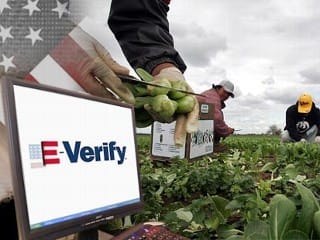E-Verify: a potential threat to California's agricultural economy


Opponents of a recently proposed House bill that cracks down on undocumented workers say that if it becomes law, it threatens to topple the agricultural economy of California – the nation's new breadbasket – risking the food and financial security of millions of Americans.
The last time the numbers were compiled, California continued its reign as the largest agricultural producer and exporter in the nation, benefiting mostly from its fertile Central Valley region. In 2009, state farmers brought in roughly 35 billion in revenue, and supplied the nation with half of all U.S.-grown fruits, nuts and vegetables. Several crops regularly purchased throughout the country and exported overseas are grown solely in the Golden State. However, the realities of nature and the laws of thermodynamics dictate how, in order to benefit so many, the Valley's bountiful harvest must be won: it requires the manual labor of hundreds of thousands of “foreign guest workers.”
Its no secret that illegal immigrants are the lifeblood of conventional farming operations in California. Unlike grain-laden Midwestern farms, most of California's 81,500 growers produce specialty crops, stone fruits and fragile commodities that don't take well to mechanized harvesting. Without a large and cheap labor force, these foods won't make it out of fields, much less into your kitchen. At least, this is the matter-of-fact argument provided by agricultural opponents of E-Verify – a federal database employers use to validate the legal status of their would-be employees.
State agricultural leaders have been frantic in their opposition to a bill introduced in June by Rep. Lamar Smith (R-Texas) that would force California farmers to use the E-Verify system to check out all potential hires. Their stance, and that of the California Farm Bureau Federation is that if the bill can't be defeated, it must be amended to accommodate the unique circumstances of California's food system. It is the only way to keep it from collapsing, they say.
House conservatives have found traction with the measure among their base, which appears to be especially reactionary during this time of high unemployment. Proponents argue that undocumented workers are taking away jobs that should go to Americans first.
But that's the solution, not the problem says Bryan Little, CFBF director of labor affairs.
"There is not another labor force out there for our industry other than the one we have now. And taking that away will create huge problems," he said.
The unfortunate fact remains that Americans don't seem to want to farm, at least not in the “traditional” sense. Valley farmers are thus caught in a dangerous place. Those who fear running afoul the law say they try to use the federal government's current guest agricultural worker program, but its mandates make recruiting a necessarily large number of workers within the narrow window of time a farmer has to accurately predict the size of his harvest, an impossibility. Others simply ignore the laws, content with harboring one of America's largest illegal labor forces.
Then there are the labor advocates. The only sensible fix for them, as well as for devotees of William of Ockham's philosophical legacy, is to legalize workers en masse.
As an instance of immigration reform, Smith's bill faces a dubitable future considering the Senate's standoffish attitude towards that subject. Still, it does make us confront a critical question: if farmers can't find enough documented workers to tend livestock and harvest crops, and if undocumented workers aren't their to pick up the slack, will California's economy and perhaps that of the nation be dramatically altered?



